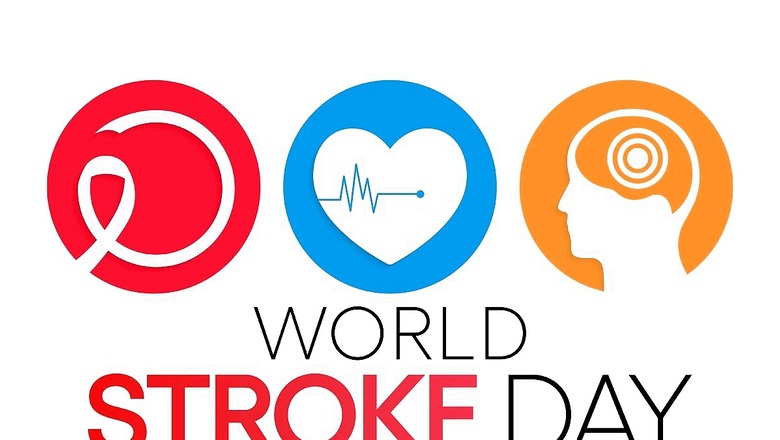
views
A teenager was among 10 others who died of a cardiac arrest within 24 hours during the garba dance festival, observed with great fanfare during Navratri in Gujarat. On World Stroke Day on October 29, greater focus is needed on the second most common cause of death in India.
According to a survey, conducted by social media community platform LocalCircles, 72 percent Indians have one or more individuals in their close network who experienced heart or brain stroke or cancer acceleration in the last three-and-a-half years since Covid.
While the root cause of such conditions is yet to be established, over 20 percent more people had such cases in their close network in the last year itself.
The survey established that 15 percent of the respondents indicated that seven to 10 close connections have experienced several medical conditions related to brain or heart stroke or cancer acceleration since Covid. Only 28 percent said they did not know anyone with any severe medical condition.
The survey’s aim was to understand if instances of severe medical conditions are continuing to occur in close networks like family, friends, colleagues and neighbours.
The first question asked was about the number of people in close social networks (family, extended family, friends, neighbours, colleagues), who have had medical conditions like brain stroke, cardiac arrest, heart attack, cancer acceleration after March 2020.
It was found that 72 percent of respondents indicated that they have one or more individuals in their close social network who experienced medical conditions like brain stroke, cardiac arrest, heart attack, cancer acceleration in the last 3.5 years.
What is disturbing is the percentage of people in this category, which has risen from 51 percent as established by a similar survey conducted in October 2022. Given that India has not had a major Covid wave after this time period, the rise is more concerning and may indicate that the events of 2020 and 2021 are the likely cause of this increase in the onset of severe medical conditions.
Rise in heart, brain strokes after Covid
The Global Burden of Diseases (GBD) study shows that India bore most of the burden of stroke with 68.6 percent of incidence, 70.9 percent deaths and 77.7 percent disability adjusted life years (DALYs) lost. Another alarming finding of the stroke project is that 5.2 million, or 31 percent, strokes were witnessed in children under the age of 20.
There has been a rise in the number of heart and brain strokes in the post-Covid world. In a new preliminary study, researchers found that Covid impacts the heart at a cellular level by causing inflammation, oxidative stress and changes in a protein that regulates calcium in the organ.
Andrew Marks, a cardiologist and biophysics professor at Columbia University involved in the research, said, “The more awareness you build around particular aspects of a disease, the more likely you are to improve the care of patients. And doctors should be aware of heart changes related to Covid-19 infections and should be looking for them.”
Scientists presented their results on February 20, 2022, at the 67th Annual Biophysical Society Meeting in San Diego, California. To investigate Covid impact on the heart, the research team looked at heart tissue from those who had suffered from Covid-19 and made several key observations.
First, they noticed an increase in oxidative stress, which can reduce the ability of the cells to detoxify harmful substances. In addition, they also observed an increase in signs of inflammation in the tissue. The team also discovered unfavourable changes in RyR2 – a protein that helps regulate calcium ions in the heart.
The disruption in calcium ion regulation can cause problems with how the heart muscle contracts resulting in irregular heartbeats, palpitations, or heart failure, as per a press statement.
Covid-19 vaccines not devoid of side effects
Covid-19 vaccines produced to give us immunity against the deadly virus were not devoid of side effects, as per a study titled ‘Vaccine-induced thrombosis and thrombocytopenia (VITT): Exploring the unknown’, led by Ashok Sunder, department of medicine in Jharkhand’s Tata Main Hospital and published online by the National Centre of Biotechnology Information, National Institutes of Health.
The report states that Covishield is a vaccine that can, though rarely, lead to VITT. Both thrombosis and thrombocytopenia usually occurred between five and 45 days of receiving adenovirus vector-based vaccines. Thrombosis occurred at unusual sites like portal vein, hepatic veins, splanchnic vein, mesenteric veins and cerebral venous sinuses.
Most patients who developed VITT were less than 60 years old and were females. But, both men and women have been diagnosed with VITT following the administration of AstraZeneca vaccine in other parts of the world.
Another study, published in the journal Cardiovascular Research in January, followed a group of more than 7,500 people with and without pre-existing heart conditions, who had Covid-19 between March and November 2020 (which is before the vaccine was available in the UK).
Compared to uninfected people, this group was around 40 percent more likely to develop cardiovascular disease and five times more likely to die in the next 18 months. People who had experienced severe infection were at even higher risk. Both in the short and long-term, those previously infected were at higher risk of heart and circulatory system problems.
Another study, published in the journal Scientific Reports, suggests that a person who develops severe Covid might also be living with undiagnosed cancer. The investigation, claimed to be the first of its kind, found that people hospitalised with severe Covid-19 had a 31 percent increased likelihood of being diagnosed with cancer afterwards, as compared with people hospitalised for other reasons and people with Covid-19 who did not need to be admitted.
“If our findings are reproduced elsewhere, screening for some cancers – for example, colon, kidney, lung, haematological [blood] – in case of severe forms of Covid could allow for early detection and treatment,” said Antoine Flahault, MD, a study author and director of the Institute of Global Health at the University of Geneva in Switzerland.


















Comments
0 comment